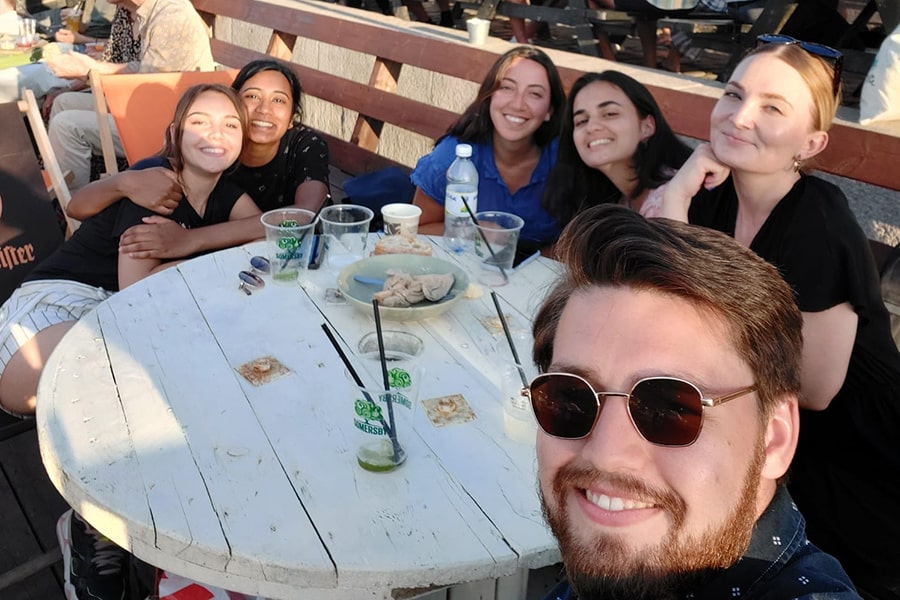A Passion for Advocacy
CMU alumna Mahima Arya (DC 2020) shines a light on injustice
By Hilary Daninhirsch
Working to change the status quo for marginalized people has always been a goal for Carnegie Mellon University alumna Mahima Arya (DC 2020).
And now as potentially the only Tartan in history to be awarded the Copenhagen Fellowship by international nonprofit Humanity in Action, she’s doing just that.
“Humanity in Action’s focus is providing young people with human rights education and offering them guidance as they pursue civic engagement projects to advance social justice,” says Mahima, who graduated with her bachelor’s degree from Dietrich College of Humanities and Social Sciences as a double major in information systems and human-computer interaction.
“As soon as I saw the fellowship information on CMU’s (Office of Undergraduate Research and Scholar Development) website, I knew it would be a good fit for me.”
The highly competitive, yearlong fellowship included a month-long program in Copenhagen, Denmark, in summer 2022. While there, Mahima and 21 other changemakers from around the globe heard from experts, attended workshops and site visits, participated in presentations and discussions, and completed a collaborative project.
Over the next year, they also will complete an action project for their local communities, too.
For her application based around the year’s theme, “The Unity of the Realm and Human Rights,” Mahima pitched an action project in partnership with her concurrent role as a computer science fellow at the Surveillance Technology Oversight Project (STOP), a New York-based nonprofit that fights the mass surveillance of marginalized groups, including immigrants, indigenous peoples, communities of color and LGBTQ+ communities.
At STOP, Mahima advocates for privacy and warns against discriminatory surveillance technology. It made sense to focus her Humanity in Action efforts in that direction with a research report.
“These technologies are inherently biased, so our marginalized communities are disproportionately impacted,” she says of surveillance technologies like facial recognition. “For example, they adopt the gender binary, completely invalidating the existence of gender-expansive people. At STOP, we are organizing at the state and local levels to abolish these systems of surveillance.”
After Copenhagen, where Mahima and two other fellows created a podcast episode focusing on preserving indigenous culture through sports, she returned to New York City. During the day, she works in software engineering, but after hours and on weekends, she focuses on moving her action project forward.
“I hope it’s an eye-opening report that brings to light some of the injustices LGBTQ+ people face,” Mahima says. “We plan to incorporate a section with tips on how to combat certain surveillance techniques, so I hope we can provide genuinely useful advice to queer people. I also hope that the policy recommendations we make will have a broader legislative impact. Ultimately, I would like to see proactive policies implemented to preserve the right to privacy.”
Mahima’s support for marginalized communities ties in with her advocacy as a CMU student.
“My LGBTQ+ advocacy started when I was the president of the South Asian Student Association,” she says. “We held educational events about injustices faced by LGBTQ+ people in South Asian countries and fundraised for charities that worked on HIV and AIDS research, mental health resources and legal rights counseling for queer individuals.”
She also served as teaching assistant for computer science and information systems courses, and her academic interests in both information systems and human-computer interaction also contributed to her current efforts.
“The combination of the two majors introduced me to human-centered approaches to the design, engineering and research phases of software development,” Mahima says. “I became interested in ethics and human rights in technology, and I wanted to get involved with nonprofit organizations like STOP and Humanity in Action to ensure innovations in the technology industry do not come at the expense of fundamental rights.”
Mahima says she’s grateful for the supportive environment at CMU, where she received encouragement from faculty and other students both professionally and personally.
“I still maintain close relationships with my professors and friends from CMU — I can’t imagine my life without them!” she says. “During my time on campus, I didn’t feel pressured to be a certain type of person; I could be myself and learn who I wanted to become along the way.”
One of those close relationships is with Office of Undergraduate Research and Scholar Development Director Richelle Bernazzoli.
“I have proudly watched as Mahima excelled at CMU and in her post-grad life, pursuing meaningful projects that made the most of her tech talents and her unyielding commitment to ethics and social justice,” Bernazzoli says. “I can’t wait to see how she’ll continue to grow as a change agent at the intersection of technology and human rights with this transformational fellowship experience at her back.”
As she advances in her career, Mahima hopes to bring more attention to human rights and privacy protections for the LGBTQ+ community.
“I am still formulating how to get there,” she says. “I’m developing my technical skills as an engineer with my full-time job and cultivating my creative skills as an activist with my fellowships. I believe growing both sets of skills will be crucial in my future work to advocate for queer people.”
